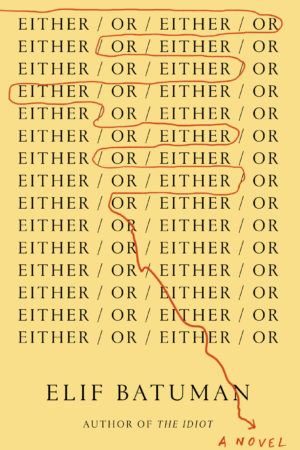Either/Or
by Elif Batuman
reviewed by Elinor Hitt
With the first year back on college campuses since the pandemic began now behind us, the occasion is aptly marked by the return of a beloved campus novel. Elif Batuman’s Either/Or is the long-awaited sequel to her 2017 debut The Idiot, which catalogued its narrator Selin’s experiences throughout her freshman year at Harvard in the early days of the Internet. Five years later for us readers, our protagonist is back for her sophomore year. Brooding love interest Ivan has moved to Stanford for his PhD, and a new life presents itself to Selin: one of antidepressants, cassette tapes, and artistic and erotic discovery.
We begin in September of 1996. Selin is sorted into Mather House, a dorm she dislikes for its imposing ’70s architecture. She tries to reach Ivan online, and her mother begins treatment for breast cancer. Selin cries constantly, stuffing used tissues down the side of her mattress. But, after starting therapy, she comes into her own, becoming something of a campus flâneur, enrolling in a creative writing class, and making plans to travel across Turkey in the summer. Most importantly, Selin excels at dating—Ivan is eventually supplanted by the gamut of men that Harvard Yard and Turkey’s major cities have to offer.
Either/Or is cut from the same pattern as The Idiot: we follow Selin through another year at Harvard, month by month. It feels a bit like déjà vu. Why, when we could encounter Selin at any point in her life, are we right back where we left off? The Idiot was a novelty when it came out, a playful exercise in autofiction that captured a distinct moment in time. But does it really have the legs to work again?
After initial hesitation, I admit that the answer is a definite yes. Batuman has produced another page-turning delight, a morsel of Ivy League realism. What is it about her formula for fiction that works? Why the mid-90s? And what is it about the voice of a college student that speaks to us all? Batuman indulges in nostalgia for an era when email was still new, when the Fugees’ version of “Killing Me Softly” was in the top ten. She depicts a time of great potential and anticipation—for America as much as for Selin, who is on the brink of adulthood and the twenty-first century alike.
Batuman borrows her title from Kierkegaard’s Either/Or, just as The Idiot took its name from Dostoevsky. In the novel, Selin acquires a used copy of the philosopher’s work at the bookstore and can’t stop thinking about it. Kierkegaard says that we all have to choose either an ethical or aesthetic life. Most of us might think of such a choice as hypothetical, but Selin takes it literally. “What was it about America in particular that seemed to make one’s life unaesthetic?” she wonders. “What was the relationship between leaving the country, ruining people, falling in love, and having sex?” And why, at Harvard, “was there no department of love?”
On the hunt for answers, Selin seeks out her first sexual experiences. At a party, she meets a boy without catching his name, subsequently christening him “the Count.” That night, they kiss in the bathroom, and later in the semester, they have sex. The Count is the epitome of the male undergraduate—from the ungainly and unromantic climb to his top bunk to his beloved skull-embossed pillowcase.
Perhaps Batuman’s genius lies in her eagerness to endow the small dramas of campus life with the same importance as the big existential questions. In the face of the national threat to abortion rights, especially, it is a comfort to find fiction that so frankly represents the reality of having sex for women. Selin is bracingly honest about the physical experience of it: in one jarring episode, she is bleeding so much after sex that blood actually pools in her shoe at a party. “The bleeding stopped the next day. I felt relieved,” she admits. “If it had lasted any longer, I would have felt like I had to go to the student health center, which was always degrading.” Such candor only makes Selin more endearing.
Here’s to her next two years at Harvard.
Published on June 21, 2022

